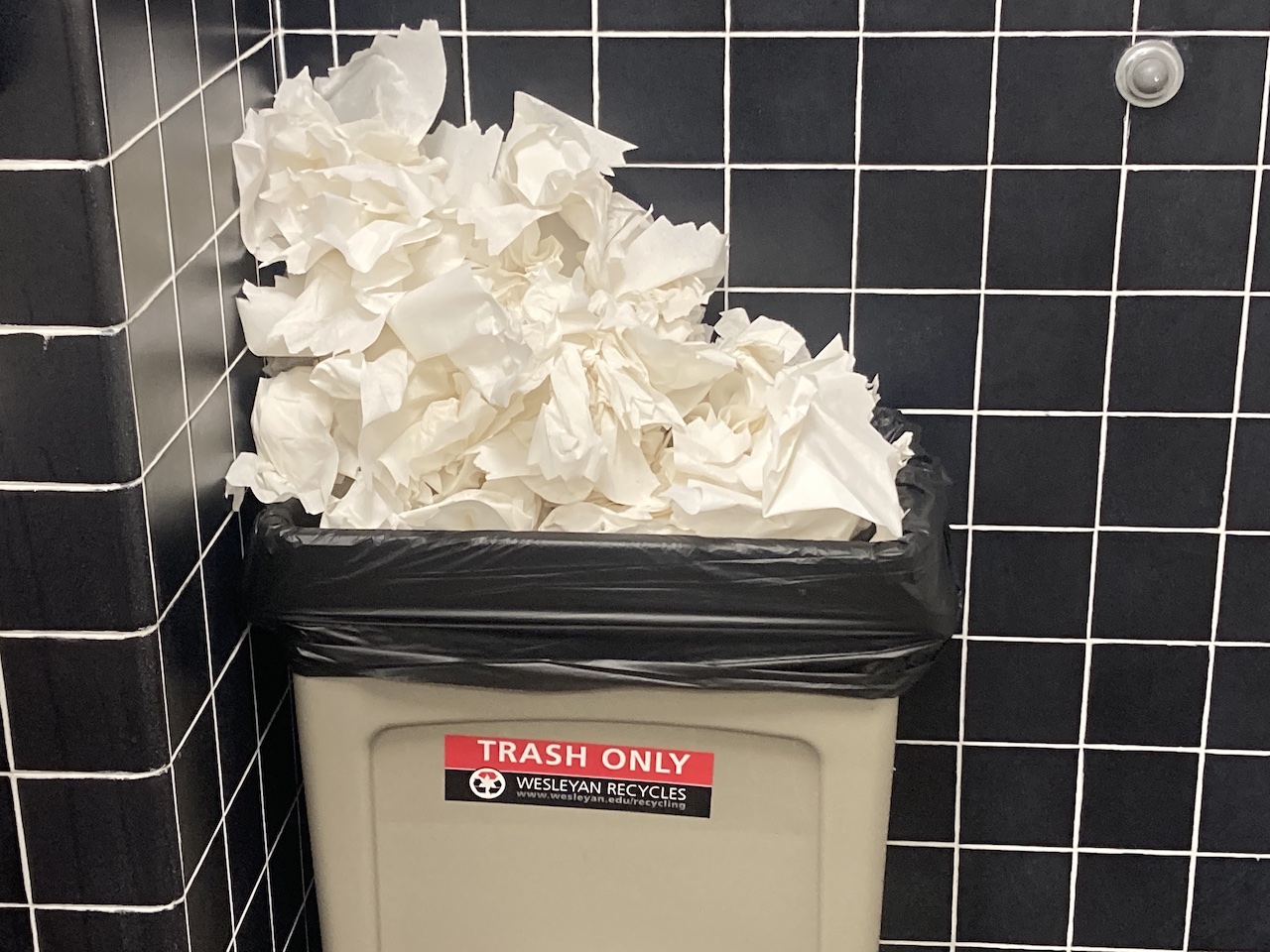
c/o Leo Bader, Assistant News Editor
Summer brought us a plethora of world-changing events and developments to discuss upon our return to campus: the Supreme Court’s affirmative action decision, several coups, India landing on the moon, and the now-recurrent array of natural disasters, to name a few. However, despite this myriad of subjects to debate, discuss, and bemoan, the dominant topic of campus conversation upon returning was something much more banal: “Why the fuck did Wesleyan remove paper towels?”
I join the campus paper towel debate in this op-ed to advance an argument much simpler than all those in favor of reinstatement: Why not? Why not reduce campus waste? Why not save money that can go towards other sustainability initiatives? Why not accept some personal responsibility for making our campus greener?
Let us first address the why-nots. The most frequently heard argument in favor of paper towels is that of inconvenience: The lack of space to keep hand towels in bathrooms, the tendency to forget your hand towel, and the discomfort of walking through the halls with wet hands and face are not ideal. I don’t dispute any of that. But consider all of the inconveniences that we already accept, even praise, in the name of sustainability. We recycle, we change our diets, and we check out reusable to-go containers, among other ways of conserving energy and resources. Can we not absorb one more into our daily routine, knowing it will have a real impact on the Univeristy’s carbon footprint?
Additionally, consider all of the conveniences that we enjoy as part of life on campus. Laundry, food, academic spaces, art spaces, and health resources—to name a few—are no more than a couple blocks away, usually much closer. If the environmental benefit is not enough to justify paper towel removal, then view it as a rare step towards real life and independence, where we will all most likely have to provide and wash a hand towel on a regular basis.
Another commonly heard argument goes something like this: The University should be taking bigger steps toward sustainability, and paper towel removal is too insignificant to make any difference. This would be a powerful argument if not for the fact that the University is undertaking several large-scale sustainability initiatives, and is preventing a lot of waste by removing paper towels. According to an email sent to me from the Sustainability Office, the University is one-third of the way done with steam-to-hot-water pipe conversion, a considerably more efficient heating alternative. Campus-wide composting, electric vehicle charging stations, and the free store WesThrift, which the Sustainability Office cited as having circulated over 2,000 items in its first year, are other notable initiatives currently in progress. These initiatives make up a bigger movement within Wesleyan’s goal being to become carbon-neutral by 2035.
Big sustainability projects take a lot of time and money to accomplish. It is imperative that the University works toward accomplishing such projects, but small steps are an equally important facet of increasing sustainability (and removing paper towels isn’t even so small: they comprise 15% of waste removed from Wesleyan buildings, according to audits performed by the Sustainability Office in 2015). Rather than saying the University should be doing more big things instead of paper towel removal, we should say the University should be doing more big things in addition to paper towel removal.
Finally, many contend that the removal of paper towels will reduce sanitary practices: Fewer people will want to wash their hands, hand towels will not be washed regularly enough, and wet hands facilitate the spread of disease. It is possible that this is true; it comes down to one’s perception of Wesleyan students. I believe that we can undertake sustainability initiatives that place a certain degree of responsibility in students’ hands, in this case to wash and dry their hands despite the lack of paper towels. Time may tell that this is false, and in that case, I may revise my opinion. But that possibility is no reason to employ rather defeatist thinking and say that we should abandon the change already.
On that note, it is essential that the University do a better job of communicating about this change and any similar future changes. Neither I nor anyone I know was aware that paper towels would be removed upon returning to campus, and I spent my first few days in a constant state of wet-handedness until a hand towel arrived. The University needs to make a serious effort to inform students on how best to maintain sanitary practices despite the change (even if that seems a little ridiculous).
If discussing the why-nots hasn’t convinced you, let us quickly go through some of the positive future benefits of this policy. First and foremost, thousands of rolls of paper towels will be saved, making a real impact on Wesleyan’s pursuit of environmental sustainability. Moreover, cleaning staff will save time by not needing to refill dispensers, allowing them to spend more energy sanitizing the space and reducing germ spread. Finally, the money saved from buying fewer paper towels will allow for more of Physical Plant’s operating budget to go toward fixing the myriad of other improvements we would like to see made to Wesleyan facilities. And, whether you like it or not, you will be personally contributing to the sustainability efforts of the University.
Perhaps this article is a bit of an overreaction; I would like to think that many more students support the change than it seems, and simply enjoy the opportunity to complain a little. I have certainly voiced frustration upon walking back to my room with a soaked face and hands. But some degree of personal sacrifice is the price we pay for a greener campus, and I hope you think about that the next time you find yourself in desperate need of a paper towel with none in sight.
Leo Bader can be reached at lbader@wesleyan.edu.